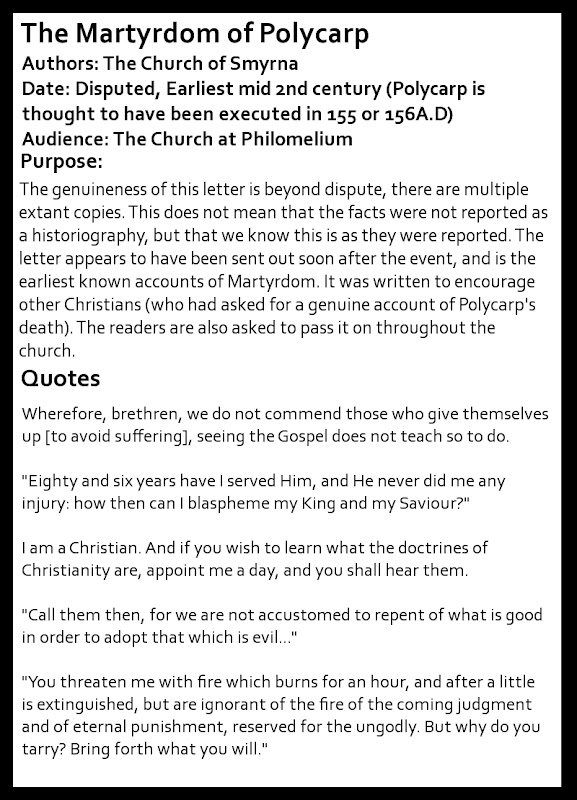So, I’m fast running out of time to put together my church history trading cards before the exam. Which is a shame. Because I really wanted to cover Origen, who emasculated himself so that he could minister to women and sescaped martyrdom because his mum hid his clothes so he had to stay inside the house naked… and Arius, who died on the public toilet just prior to being readmitted to the church… I’ll try to get around them, but the pre-exam motivation really is the driving force behind getting them up…
Anyway. In order to attempt to get a cohesive picture of the first 550 years of the church I’m going to try to give one rapid fire overview of the significant people and moments from that time.
Kicking off in 64 A.D, Nero was the first Roman emperor to actively persecute Christians. It was a pretty sporadic afair. But he also persecuted Jews, and the temple was destroyed in the Jewish revolt of 66-74 A.D. Nero blamed Christians for a fire in Rome, and used that as an excuse to pursue the church. Domitian was the next emperor to systematically pursue Christians. Domitian also had a big head, at least as far as this statues is reliable…
Second Century
The century turned, and in the second century the gnostic movement took off a little bit, trying to rebrand Jesus as a gnostic teacher who taught secret mysteries. Marcion also sprung up with his little heresy (throwing out the Old Testament, and only keeping a few bits of the new). He was a bad guy. A heretic. The first of his kind (well, the first recognised by the church. But his “canon” caused the early church to put together a real canon. The Apostolic Fathers – Clement, Ignatius, Polycarp, and Didache, were some of the leaders of the church at this point – they were guys who were thought to have had contact with the apostles, thus providing some form of doctrinal continuity. Polycarp was martyred in 155 A.D, and Justin Martyr ten years later – having written his two Apologies for Christian belief to the Roman emperor – demonstrating that the church was still on the outer with Rome. The next cab off the rank, heresy wise, was Montanism. Tertullian came on the scene towards the end of the second century and wrote strongly against gnosticism, and Marcionism, and his own apology for Christian belief (seeking much the same as Justin Martyr – to ahve Christians treated fairly and recognised as a religio licita) but he took up the Montanist cause (which meant that the Catholic church refused to make him a saint. Montanists believed they had a new prophecy, and didn’t much like the veneer of compromise they saw in the church – they also loved martyrdom.
Third Century
Irenaeus, Tertullian, Origen and Cyprian were some figures around the beginning of the third century (and at the end of the second). Irenaeus (who studied under Polycarp and Justin Martyr) and Tertullian both got their own trading cards.
Decius, the emperor in the middle of the century kicked off some further persecution of Christians by decreeing that all citizens of the empire were to sacrifice to the emperor in a pledge of allegiance to Rome. They had to do it within a certain time, and they’d get a certificate to prove it. Anybody who refused was a traitor. Many Christians died in the process, luckily Decius was only in power for two years.
Origen was an Alexandrian, and a Christian with a particularly platonic bent. A church council in the sixth century declared him to be a persona non grata – and many of his works were burned as a result. He was a controversial figure and pushed for some sort of hierachy within the trinity (amongst other foibles) – most of which grew from his Platonic philosphy. He wrote lots, learned Hebrew, and put together a parallel translation of the Old Testament. His translations of the Hebrew were discussed in Augustine’s conversation with Jerome (about Jerome’s own translations – Jerome thought following Origen was a good idea, Augustine thought he was a little iffy). His exegetical method was pretty sound, and he only really used allegory as a last resort (and more typographically and Christologically than others). Origen’s exegetical approach, as he looked for hidden meaning in texts, included focusing on the meanings of proper nouns within the OT. He preached through the Old Testament, and while he was into finding hidden meanings in the text, he wasn’t a gnostic (and he wrote against them), he thought historical context wasn’t hugely important, and in a way he was proto-Barthian. He was rigorously committed to the Scriptures, and all his teachings were at least tied to some text or another. He was a theologian (some suggest the world’s first), who was also committed to integrating Christianity with philosophy and ethics. Most of his failings theologically come from this philosophical commitment and arise when his Platonic thoughts about the nature of the soul (for example, that it pre-exists the body) encroach on his theology and exegesis. His ecclesiology was pretty sound. He recognised two churches – the “church of angels” (those in Christ) and the wider church, which also sheltered sinners. A physical church, and a spiritual church. Another pretty Platonic (though correct) idea. His approach to Christian teaching was very similar to Augustine’s, he sought to syncretise the scientific and philosophical understandings of his day with Christian belief. And was committed to his students receiving a broad “liberal arts” education of the classical Roman variety. He wrote against ideas like soul sleep, and Ggnosticism, but his positives, so far as the later church was concerned, were outweighed by his heresies. Origen was tortured as a Christian during the Decian persecution, and he died three years later from the injuries he sustained.
Cyprian was the bishop of Carthage in the mid-third century. His thinking was influenced by Tertullian (both were north Africans, so were from the “Latin West”). He was a trained orator, who taught rhetoric before he became a Christian. He wrote heaps of stuff that has survived – and he was obviously a pragmatist, because while debate was raging within the church about how to handle Roman persecution he bolted. He didn’t stick around for the decision on whether to participate in the sacrifices for Deciu, or to engage in civil disobedience. He ran for the hills, and ruled his church from afar via a messenger. Obviously he wasn’t a complete coward though (which some accused him of being) because he was eventually martyred. Controversially, and somewhat hypocritically, Cyprian didn’t treat other people who avoided persecution by leaving the church very well, or at least he didn’t want to let them straight back in when the persecution ended. He insisted on “earnest repentance,” when some disobeyed him (including a deacon from Carthage) he excommunicated them, and created a bit of a schism. A council of North-African bishops in Carthage sided with Cyprian on the treatment of “lapsed” Christians – and they could only be readmitted to the church on their deathbeds (though this decision was softened somewhat). Church leaders who had sacrificed to the emperor could not be restored to their original posts.
A debate about baptism flared up in 255, where the church believed baptism was ok if done in a church and in the name of the trinity, Cyprian believed any baptisms conducted by heretics were invalid – in this way he was a precursor to Donatism, which emerged later. At this point, his adversary Stephen, Bishop of Rome tried to trump Cyprian’s position on the basis of his geographic situation. Cyprian didn’t like that very much. He said that all bishops were equal. He died bravely in a new bout of persecution under Valerian. Going willingly to his execution

